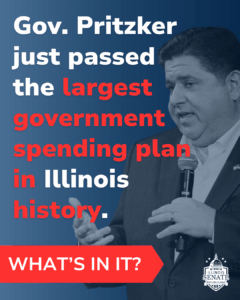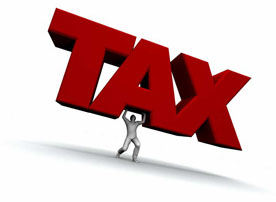Record-Spending Budget Passes the General Assembly

SPRINGFIELD – Governor JB Pritzker’s record-breaking spending plan—which relies on nearly $1 billion in tax increases and gimmicks—passed the General Assembly on May 31.
Once signed into law, it will become the largest budget in Illinois history, totaling more than $55 billion. That figure represents a staggering increase of nearly $15 billion, or almost 40 percent, since the Governor first took office.
State Senator Dave Syverson (R-Cherry Valley) voted against the proposal, arguing it reflects misguided priorities that grow government at the expense of working families.
The spending plan includes nearly $1 billion in new taxes and fiscal gimmicks. Among them are higher taxes on vacation rentals such as Airbnb, new taxes on gaming, increased taxes on phone services and nicotine products, and hundreds of millions in new taxes on businesses—costs that will ultimately be passed along to consumers. Democrat leaders also relied on nearly $400 million in one-time revenue grabs and accounting tricks to balance the books.
While Democrat leaders continue to spend millions in funding on non-citizen programs, the new budget falls short for Illinoisans with developmental disabilities, K-12 and college students, and taxpayers who are footing the bill. Instead of offering real relief to working people, senior citizens, and families, Democrat leaders are choosing to dig deeper into residents’ pockets.
Republicans Block Additional Tax Hikes—But Warn the Fight Isn’t Over

While the budget includes significant new tax burdens, Republican lawmakers also blocked several of the most damaging proposals—though they caution that these ideas could likely return.
One proposal would have added a $1.50 delivery tax to nearly every package shipped to Illinois homes. Far from a luxury, delivery has become essential for many working families—providing access to groceries, diapers, medications, and meals after long days on the job. This tax would have penalized the very people who rely on those services the most.
Another measure would have imposed a new service tax on routine needs like car repairs, home maintenance, and personal care. It was effectively a tax on daily life, making it more expensive to fix a leaking pipe, get a haircut, or keep a vehicle safely on the road.
A third proposal—a mom-and-pop business tax on digital advertising—would have raised costs for small, family-run businesses that depend on affordable online marketing to reach customers. By making it harder for these businesses to compete and grow, the tax also would have hurt the families and communities that rely on them for jobs, goods, and services.
Lawmakers who opposed these proposals say this isn’t the end of the fight. These taxes were stopped—for now—but they are part of Governor Pritzker’s long game: growing government and shifting the cost onto the very people who can least afford it. If they return, it’s working families, senior citizens, and those already stretched to the breaking point who will bear the brunt.

